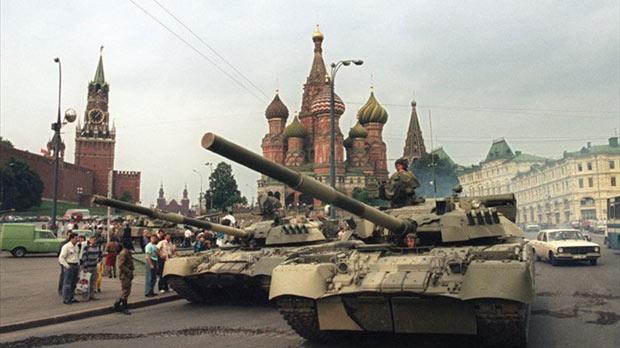At the Barricade and the Importance of Speaking Clearly
 Wednesday, September 23, 2015 at 11:12PM
Wednesday, September 23, 2015 at 11:12PM Andrew Solomon makes a beautiful and forceful point about one’s ability to articulate yourself properly in his “The Moth” story, At the Barricade, in which he recounts a moment of resistance that he witnessed at American Embassy during the final moments of the fall of the Soviet Union, when he was there by happenstance. I’ve transcribed the excerpt I’m referring to below, and you can click here to hear his story in its entirety.
Andrew Solomon, At the Barricade (from the last third of the story):
And when we got there, it was such a Russian scene: there were flowers strewn on the ground, there were old women crying, there people talking about the nature of tragedy. And we were all standing around, and suddenly, a young man came running up. He had a tweed cap clutched in his hands and wire-rimmed glasses, and he looked like a 1917 Revolutionary or the student in a Chekov play, and he said, “Hurry up, come at once, there are tanks approaching the outer barricade. We have to go and defend the outer barricade!”
Well there had been tanks endlessly approaching and they had just always parked across the street. And so we walked up to the outer barricade, quite far away in fact from the parliament building, and we arrange ourselves in front of it, holding hands. And two minutes later, a column of tanks rolled up, and they stopped about two feet away from us. And it was still the Cold War, and I had grown up thinking that there was nothing more frightening in the world than a Soviet tank coming up to you. And the soldier on the front tank said, “We have been given unconditional orders to destroy this barricade. If you move out of the way, we don’t need to hurt anyone, but if you won’t move out of the way, we’ll have no choice but to run you down.” And the artist I was with said, “Give us just one minute. Give us just a minute to tell you why we’re here.”

Image from: www.timesofmalta.com
And the solider on the front tank crossed his arms, and the artist on the front tank launched into a description of what freedom was. And they said, “You are very young, you don’t remember the Stalin ear, let me tell you what it was like: it was terrible.” They said, “You don’t remember what it was like when Brezhnev ran things, but that was terrible too.” And they said, “You say that you’re just following orders, but you’re making a choice to follow those orders, but you’re making a choice, and you could make a different choice instead.” And they launched into a Jeffersonian panegyric to democracy, of kind of those of who live in democracies mostly couldn’t muster. And when they finished, we stood there, sneezing, wet, cold, bedraggled, and the solider on the front tank just stared at us for a full minute. And at the end of a minute he said, “What you’ve said is true, and we must bow to the will of the people. If you’ll clear us enough space to turn around, we’ll go back and we’ll leave you you’re barricade. And we all stepped aside, and the tanks made U-turns – which is not so easy for a tank – and they drove off the way that they had come. And we all embraced one another.
And then, I had to go to the airport because my visa expired that day. And I got in a cab and was on my way to the airport when the news came on: the Putcsh had failed, Yeltsin was in charge, Russia was to be a democracy. And I thought that language had come back for me. I thought that I would be able to write and talk again, because what I had always hoped, but never believe to be true was that if you could only speak clearly enough about important things, you could change the world.
 Aaron |
Aaron |  Post a Comment |
Post a Comment | 

Reader Comments